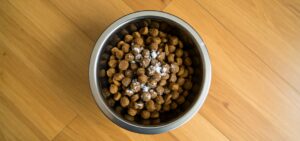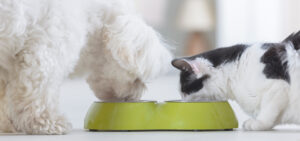
Dog Immune System Boosters That Work
Category:Health,NutritionDog Immune System Boosters That Work!
If ever anybody needed an immune system booster, it’s dogs! Think about it … dogs are close to the ground. That means they get more than their fair share of pesticides, chemicals and toxins on their feet and bodies. Dogs may also be over-medicated, with too many antibiotics, vaccines, or pest preventives.
Your dog’s food can also stress her immune system. They commonly carry toxic ingredients like fluoride, aflatoxins, heterocyclic amines and acrylamides. These toxins build up in the body and stress the immune system.
Toxins In Dogs
While their harmful effects aren’t seen right away, sooner or later these toxins show up as common health problems including:
- Allergies
- Cancer
- Organ disease (liver, kidney, heart, etc)
- Digestive issues
- Immune diseases
It’s a challenge for dogs living in the modern world!
4 Immune System Boosters For Dogs
Fortunately, there are natural dog immune system boosters that are inexpensive and easy to use. And they don’t carry the same side effects that some drugs do.
Here are 4 of the best-researched dog immune system boosters.
- Echinacea
- Medicinal Mushrooms
- Colostrum and Lactoferrin
- Probiotics
Let’s look at them in detail and then you’ll learn how to give them to your dog.
1. Echinacea
Echinacea (purple coneflower) was “discovered” in the late 1800s by a traveling salesman named Joseph Meyer. He learned about it from the Plains Indians while traveling out west. He and researchers have since found it provides excellent immune system support.
Echinacea can activate macrophages which are immune cells that seek out and destroy foreign invaders. It also boosts T-cell production and chemokines, which help immune cells migrate to areas of infection. The key is that you need to give it to your dog before he is sick to set his immune system up for success.
Its immune-boosting abilities come from the components echinacoside and echinacein. They support his immune system further with:
- Natural antibiotic and anti-fungal properties that can kill a broad range. Making it a helpful addition to wound healing.
- Anti-viral properties that offer support against diseases like dog flu, kennel cough, and parvovirus.
- Preventing the growth of cancer cells and extending lifespan.
When To Give Your Dog Echinacea
- Before he meets new dogs
- Ahead of stressful events
- Before and during boarding at kennels or daycares
How To Give Your Dog Echinacea
It’s best to buy a low alcohol glycerin extract which is absorbed more quickly and easier to dose in dogs because of echinacea’s unpleasant taste. Glycerin’s sweet taste masks the flavor and makes it more palatable.
Expert opinions vary on how long you can dose echinacea. Many herbalists, including Gregory Tilford and Mary Wulf, authors of Herbs For Pets, say it’s most effective to take a 2-3 day break from echinacea every 5 days. Herbalists believe the body’s response to echinacea falls off after about 5 days of use but is renewed after a break. However, a study by Sandra C Miller at McGill University fed Echinacea to mice every day from age 7 weeks until to 13 months and found the results “…provided concrete evidence that chronic (long-term) intake of Echinacea was not only not detrimental but also distinctly prophylactic.”. So, you might want to ask your holistic vet or herbalist what’s the best approach for your dog.
The recommended dose for dogs is 1/2 ml for every 15 lbs of body weight. Give just before feeding, up to 3 times daily.
2. Medicinal Mushrooms
There are a variety of medicinal mushrooms that have immune boosting properties. And combinations of several medicinal mushrooms seem to work best.
The major medicinal mushrooms include:
Reishi
Reishi has anti-cancer and immune-enhancing effects. This is due to its mucopolysaccharides. These are complex sugars that the body incorporates into its cell membranes. This “coating” makes cells resistant to viruses and harmful bacteria.
Reishi mushrooms also contain triterpenes. These stimulate the production of a special protein called tumor necrosis factor (TNF). TNF regulates immune cells and kills cancer cells. They are also rich in polysaccharides. They activate the macrophages that “eat” viruses, bacteria, and other foreign invaders.
Maitake
Maitake mushrooms have a very high concentration of a unique polysaccharide compound called beta-1,6-glucan. Researchers consider this beta-glucan to be one of the most powerful immune stimulants known.
Studies found maitake produced a 64% inhibition of breast cancer and tumor activity in mice … and a 75% inhibition of skin cancer and tumor activity. The US National Cancer Institute (NCI) and the Japanese National Institute of Health ran more studies. These showed that maitake extract killed the human immunodeficiency virus (HIV) and enhanced the activity of helper T-cells. Researchers reported that the maitake extract was as powerful as AZT. A commonly prescribed AIDS drug … but without the toxic side effects.
Overall, maitake protects healthy cells from becoming cancerous. This helps prevent the spread of cancer (metastasis) and slows or stops the growth of tumors.
Turkey Tail
This medicinal mushroom was approved by the FDA for a trial in cancer patients. Turkey tail mushroom is rich in beta-glucans and also in Polysaccharide K (PSK). This active compound is approved to treat cancer in Japan and few side effects have been reported (9).
A 2012 Penn State study reviewed turkey tail use in dogs with hemangiosarcoma. Dogs treated with PSK from turkey tail mushrooms had the longest survival times ever reported for dogs with this common cancer.
And there are other immune-boosting mushrooms. These include:
Ideally, you’ll want to give your dog a blend of several of them.
When To Give Your Dog Mushrooms
- As he ages, for anti-oxidant and anti-cancer support
- If he’s battling cancer
- When he’s fighting a virus or other infection
How To Give Your Dog Mushrooms
Follow package dosing if you buy a mushroom supplement for dogs. You can give them once a day for prevention or twice daily for dogs with immune challenges.
But be sure your dog’s mushrooms are double extracted and are really whole mushrooms … not mycelium, Mycelium is only a part of the mushroom … and it has less beta-glucans and lower medicinal benefits than whole mushrooms.
3. Colostrum
Colostrum is the clear, yellowish, pre-milk fluid produced from mother’s milk the first 72 hours after birth. It provides both immune and growth factors. And these are essential for the health and development of the newborn.
A review of colostrum research shows that bovine colostrum (from cows) is virtually identical to the human form … except that the immune factors are several times more concentrated. These immune factors help the body fight against viruses, bacteria, yeast, and fungi. Plus, colostrum contains antibodies against harmful bacteria, including E coli, Salmonella, Rotavirus, Streptococcus, Staphylococcus, H pylori, and Cryptosporidia.
Colostrum contains a substance called proline-rich-polypeptide (PRP), which is an immunomodulator. This means it boosts an underactive immune system and balances an overactive one.
Another key component of colostrum is transfer factors. These are small molecules that transfer immunity information from one animal to another. In effect, they transfer immunity “memory” that gives your dog instant resistance to a number of diseases.
Colostrum is a potent source of lactoferrin, a globular protein produced in the body. Lactoferrin is found anywhere that’s especially vulnerable to attack … like the gut, eyes, ears, nose, throat, and urinary tract. Lactoferrin can stop viruses from growing. It also limits tumor growth and metastasis and kills both bacteria and yeast (including Candida).
Supplementing your dog with lactoferrin can significantly boost his immune system, which helps him fight disease. This is critical for dogs taking antibiotics or with gut imbalances … since the intestinal flora produces lactoferrin.
You’ll want colostrum from grass-fed dairy cows with 40% immunoglobulins (or antibodies).
When To Give Your Dog Colostrum
- If he’s not maintaining weight
- When he’s suffering from allergy symptoms
- If he’s prone to infections
How To Give Your Dog Colostrum
Colostrum is best fed on an empty stomach … but you can feed it with a small amount of yogurt or broth. Dr Gloria Dodd DVM recommends giving it for one month, then as needed.
If you’re giving a powder, give 1/8 teaspoon per 25 lbs of body weight, twice daily, Some colostrum will come in capsule form for dogs. Follow the instructions on the label for dosing recommendations.
4. Probiotics
About 90% of your dog’s immune system comes from his gut. So probiotics are important in supporting immune health. Probiotics are beneficial bacteria such as bifidobacteria and L. acidophilus. These good bugs compete for space and crowd out the pathogenic bacteria that enter the gut..
Some probiotics also produce a protective mucosal layer. And this layer is what keeps bacteria from entering the lining of the intestines. When bacteria and other toxins get through the lining into the blood stream, that creates inflammation which can lead to a leaky gut.
Probiotics produce the short-chain fatty acids lactic acid and acetic acid. These discourage the growth of pathogenic bacteria. This means less chronic inflammation in the body. Reducing chronic inflammation is a big step in disease prevention … including cancer risk.
And bacteria like Lactobacillus can decrease the production of salmonella and E. coli in vitro. They can regulate the growth of pathogenic bacteria and viruses to help prevent disease.
When To Give Your Dog Probiotics
- If he has loose or soft stools
- When he’s struggling with allergies
- If he’s prone to any illness
How To Give Your Dog Probiotics
You’ll want to give your dog probiotics at least a few times each week as prevention. And daily if she’s currently unwell. By feeding probiotics regularly you’ll have fewer diarrhea episodes to worry about. And you’ll be boosting your dog’s immune system too.
Echinacea, medicinal mushrooms, colostrum and probiotics are the top 4 ways you can boost your dog’s immune systems safely and effectively. Try one or more on your dog today.
Dana Scott
Dana Scott is the founder of Dogs Naturally Magazine. She’s a sought-after speaker and loves to help dog owners give their dog a healthier, more natural life. Dana also breeds Labrador Retrievers under the Fallriver prefix and has been a raw feeding, natural rearing breeder since the 90’s. Dana works tirelessly to educate pet owners so they can be the driving force to change veterinary medicine for dogs and make their world a safer place. Visit Dana’s Labradors at Fallriver Labs








